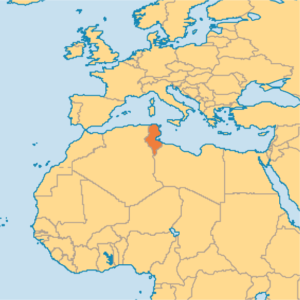TODAY’S READING FROM THE OLD TESTAMENT- Ezekiel 45:13-46:24
 The operation of the temple will be provided through the offerings of the people given to the prince. This is similar to the provisions of the sanctuary shekels in Exodus 30:11-16 and not the same as the tithe. One-sixth of all grain and one percent of oil and one of every 200 animals shall be given to supply the offerings for the New Moon, new month celebrations, the Sabbaths, all feast days and festivals that take place at the temple.
The operation of the temple will be provided through the offerings of the people given to the prince. This is similar to the provisions of the sanctuary shekels in Exodus 30:11-16 and not the same as the tithe. One-sixth of all grain and one percent of oil and one of every 200 animals shall be given to supply the offerings for the New Moon, new month celebrations, the Sabbaths, all feast days and festivals that take place at the temple.
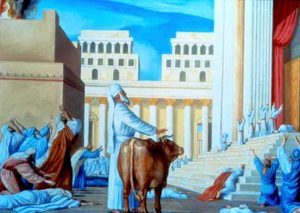 Every human being needs cleansing from all sin and the forgiveness of God. They need the assurance of God’s acceptance that comes through repentance of sin and faith in the Messiah. They need the once and for all sacrifice that Jesus provided on the cross. These needs are reflected in the ceremonies Ezekiel sees performed in his temple vision.
Every human being needs cleansing from all sin and the forgiveness of God. They need the assurance of God’s acceptance that comes through repentance of sin and faith in the Messiah. They need the once and for all sacrifice that Jesus provided on the cross. These needs are reflected in the ceremonies Ezekiel sees performed in his temple vision.
Ezekiel 45:18 -25 describes the regulations for observing the Feasts of Israel. First, there is the purification of the temple on the first day of the first month. The same ceremony is repeated on the seventh day, the Sabbath, for everyone who “goes astray or is naïve” or, as some translations put it, ‘who sins unintentionally or through ignorance’ (45:20).
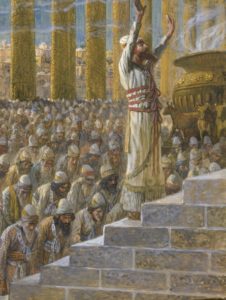 The prince is also responsible for the faithful observance of the Passover, the Feast of Unleavened Bread, the daily offerings (v.23), and the seven-day feast of Tabernacles (Lev 23:33-36; Numbers 29:12-38). These Feasts were to celebrate the redemptive work of the Messiah.
The prince is also responsible for the faithful observance of the Passover, the Feast of Unleavened Bread, the daily offerings (v.23), and the seven-day feast of Tabernacles (Lev 23:33-36; Numbers 29:12-38). These Feasts were to celebrate the redemptive work of the Messiah.
It is interesting that of the seven feasts of Israel, only Passover (45:21-24) and Tabernacles are mentioned in relationship to Ezekiel’s vision of the temple (45:25; Zech 14:16-19).
Jesus implies that we will be remembering His sacrifice with the breaking of bread and taking of the cup in the Kingdom age.
Matthew 26:29 29 “But I say to you, I will not drink of this fruit of the vine from now on until that day when I drink it new with you in My Father’s kingdom.”
Chapter 46 lists the regulations for the Sabbath. Because the prince is not a priest, he will not enter the inner court, but he will carry out his ministry at the east gate to the inner court while the people are just outside the gate in the outer court. The prince appears to be in a mediatorial role between the people in the outer court and the priests in the inner court.
Elements of the Old Covenant are remembered as the redemptive work is celebrated through these commemorative feasts.
Notice that there is always a flow of people into the court. They must never go out the same way they came in! (May this be true of our experience every time we gather for worship!)
Ezekiel 46:9 9 “But when the people of the land come before the LORD at the appointed feasts, he who enters by way of the north gate to worship shall go out by way of the south gate. And he who enters by way of the south gate shall go out by way of the north gate. No one shall return by way of the gate by which he entered but shall go straight out.”
The prince would meet with the worshipers as they entered.
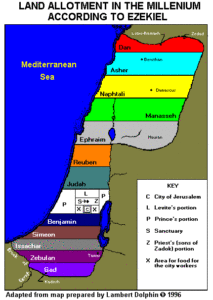 Inheritance and property rights were very important to the Israelites. All property was to be returned to the original owner or the family of the original owner on the Year of Jubilee (Lev 25:10). This will apply to lands given by the prince to his servants, yet that which is given by the prince to his sons shall remain with them forever.
Inheritance and property rights were very important to the Israelites. All property was to be returned to the original owner or the family of the original owner on the Year of Jubilee (Lev 25:10). This will apply to lands given by the prince to his servants, yet that which is given by the prince to his sons shall remain with them forever.
This brings to mind:
Galatians 4:6-7 6 Because you are sons, God has sent forth the Spirit of His Son into our hearts, crying, “Abba! Father!” 7 Therefore you are no longer a slave, but a son; and if a son, then an heir through God.
Ezekiel gets a tour of the kitchen in Chapter 46:19-24.
The priests must prepare the offerings for the people, away from the people, for they are holy ‘separate’ offerings.
TODAY’S READING FROM THE NEW TESTAMENT – 1 Peter 1:13-2:10
 If indeed you have tasted that the Lord is good—then you will not have an appetite for anything else but what is of Him. If you have tasted the truth, you will want to dismiss all lies, hypocrisy, and slander. If you have tasted God’s love, you will put aside all malice, envy, and deceit. If you have personally experienced the new birth, then like a new-born babe you will have an appetite for the pure spiritual milk of God’s Word. These are the vital signs of regeneration. We do need to remind one another of this because the habits of our old nature will make a bid to compete with the desires of the new nature.
If indeed you have tasted that the Lord is good—then you will not have an appetite for anything else but what is of Him. If you have tasted the truth, you will want to dismiss all lies, hypocrisy, and slander. If you have tasted God’s love, you will put aside all malice, envy, and deceit. If you have personally experienced the new birth, then like a new-born babe you will have an appetite for the pure spiritual milk of God’s Word. These are the vital signs of regeneration. We do need to remind one another of this because the habits of our old nature will make a bid to compete with the desires of the new nature.
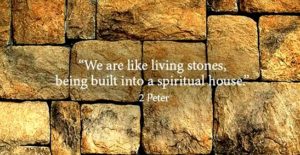 As born-again believers, not only do we hunger for new food, the Word of God, we hunger for fellowship with the people of God. The church is God’s building, and the members are living stones. Christ is the Cornerstone. Jesus is described as a living stone, a chosen stone, and a precious stone. Peter points out that Jesus fulfills the prophecies of Isaiah 28:16 and Psalm 118:22.
As born-again believers, not only do we hunger for new food, the Word of God, we hunger for fellowship with the people of God. The church is God’s building, and the members are living stones. Christ is the Cornerstone. Jesus is described as a living stone, a chosen stone, and a precious stone. Peter points out that Jesus fulfills the prophecies of Isaiah 28:16 and Psalm 118:22.
Isaiah 28:16 16 Therefore thus says the Lord GOD, “Behold, I am laying in Zion a stone, a tested stone, A costly cornerstone for the foundation, firmly placed. He who believes in it will not be disturbed.”
Psalm 118:22 22 The stone which the builders rejected Has become the chief corner stone.
 The rejection of the Messiah was predicted by the prophets. Because Jesus was not the Messiah the Jewish leaders were expecting, they stumbled over him. We don’t just recognize this in hindsight. Jesus Himself referred to this prophecy when he debated with the Pharisees and Sadducees in Matthew 21:42- 44. He who was despised and rejected, God has raised from the dead and made the chief cornerstone from which all the building will take its direction and shape!
The rejection of the Messiah was predicted by the prophets. Because Jesus was not the Messiah the Jewish leaders were expecting, they stumbled over him. We don’t just recognize this in hindsight. Jesus Himself referred to this prophecy when he debated with the Pharisees and Sadducees in Matthew 21:42- 44. He who was despised and rejected, God has raised from the dead and made the chief cornerstone from which all the building will take its direction and shape!
Warren Wiersbe reminds us, “In the Old Testament period, God’s people had a priesthood; but today, God’s people are a priesthood.”
We have greater privileges than the priests of Levi or Zadok in that we can continually minister to the Lord and offer spiritual sacrifices such as praise (Hebrews 13:15), generosity (Philippians 4:18), service (Philippians 2:17; 2 Timothy 4:6), and loving deeds (Hebrews 13:16). We offer our bodies, a complete surrender to the Lord (Romans 12:1). We offer up the sacrifice of prayer (Psalm 141:2).
Psalm 141:2 2 May my prayer be counted as incense before You; The lifting up of my hands as the evening offering.
We can minister to the Lord like the priests of Zadok in Ezekiel 45, yet we do this as those who are royal sons of God being built into a spiritual house. We are actively called into His ministry with the privilege of kings and priests (Revelation 1:6). We offer sacrifices acceptable to God through our Lord Jesus Christ. How does this happen? “By coming to Him!”
1 Peter 2:4 4 And coming to Him as to a living stone which has been rejected by men, but is choice and precious in the sight of God,
TODAY’S READING FROM THE BOOK OF PSALMS – Psalm 119:33-48
We read the next two sections of Psalm 119 today. Verses 33-40 all begin with the 5th Hebrew letter of the alphabet- the aspirate ‘hey’. This letter is associated with God’s breath supercharging all He redeems with divine life. This is what we need- We need the Holy Spirit to breathe on our hearts and minds, open our spiritual understanding so we can be taught so that we can observe the way of His statutes, keep the law in our hearts and walk with delight in the path of His commandments (119:33-35).
 We need the Holy Spirit to turn our eyes from beholding vanity, so we can say ‘no’ to ungodliness and dishonest ways of self-promotion (Titus 2:11-12). We need the Holy Spirit to incline our hearts to joyfully obey God’s Word and reverently long for His precepts, reviving us in righteousness.
We need the Holy Spirit to turn our eyes from beholding vanity, so we can say ‘no’ to ungodliness and dishonest ways of self-promotion (Titus 2:11-12). We need the Holy Spirit to incline our hearts to joyfully obey God’s Word and reverently long for His precepts, reviving us in righteousness.
Verses 41-48 all begin with the letter’ vav’. These verses recognize that the knowledge of God’s way of salvation comes through putting faith in God’s Word (Psalm 119:41-42). The Psalmist is resolved to be a man of the Word. When we know that because the Law-Giver has become the Law-Keeper in our hearts, we can ‘walk at liberty’! (Psalm 119:45). We can be a bold witness before the rulers of this world (v.46).
What a heart change- to be able to love the Word of God, delight in His commands, lift our hands in the full surrender of obedience to Christ, and to meditate on His statutes!
TODAY’S READING FROM THE BOOK OF PROVERBS- Proverbs 28:11
Proverbs 28:11 11 The rich man is wise in his own eyes, but the poor who has understanding sees through him.
Discern what truly makes a person wise and wealthy. When we have the mind of Christ, we can see through temporal and material delusions.
PRAY FOR THE NATIONS – TUNISIA
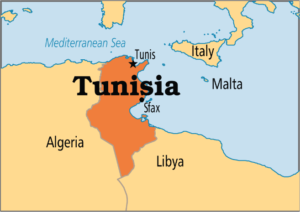 (from “Operation World Prayer Guide” and Prayercast.com)
(from “Operation World Prayer Guide” and Prayercast.com)
Tunisia
Republic of Tunisia
Africa
The flag of the Tunisian Republic is washed in red to represent the blood shed by martyrs in the struggle against oppression, a struggle that continues today for Christians in this northern African nation. Tunisia has long been considered a restricted nation, one that does not allow the spread of the Gospel, and the government is further grounding itself in Islam. In 2010 a fruit vendor named Mohamed Bouazizi set himself on fire to protest his lack of opportunity in the repressive nation divided into police states. This began the Jasmine Revolution that resulted in the demise of the authoritarian president. In October 2011, the first free election was held, and the Islamic party Ennahda came into power. This has made many uneasy as the role of Islam in public life is becoming more prominent.
The Tunisian economy plummeted with the political turmoil in 2011, resulting in high unemployment rates in some areas of the nation. The new government was left with the task of stabilizing the broken economy. As a result of the revolution and newly installed government, new press freedoms have been authorized; media companies are not as tightly under the government’s control as before. Women have always had advanced rights compared to other Muslim nations, as polygamy, for example, is illegal; however, divorce and abuse are still prevalent in society.
There are an estimated 13,000 Christians in Tunisia, barely one quarter of one percent of the population, and most of these are non-Tunisian. Nearly a third do not congregate with other believers as they live far from one another. Christians face persecution from family and friends, and following Jesus risks their jobs, social stature, and pressure from authorities. Persecution has increased since the revolution, and several church leaders have left the nation due to threats. Without these leaders, evangelism and discipleship are becoming increasingly difficult. Of the 23 people groups in Tunisia, 14 have never heard the Good News. Christian literature cannot be openly distributed, but Christian media has been blossoming as a result of the press freedoms.
Geography
Mountainous and agricultural in the north, Sahara Desert in the south. The site of notable civilizations: Carthaginian, Berber Christian and Arab Islamic.
Population: 10,373,957 Annual Growth: 0.98%
Capital: Tunis
Urbanites: 67.3%
HDI Rank: 98 of 182 (UN Human Development Reports 2009)
Peoples
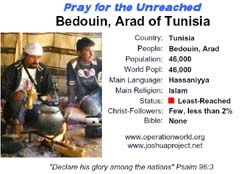 Peoples: 23 (65% unreached) All peoples
Peoples: 23 (65% unreached) All peoples
Unreached Peoples Prayer Card
Official language: Arabic. French widely used but declining as English increases Languages: 10 All languages
Religion
Largest Religion: Muslim
|
Religion |
|
Pop % |
Ann Gr |
|
22,785 |
0.22 |
1.0 |
|
|
1,154 |
0.0 |
4.7 |
|
|
Muslim |
10,317,975 |
99.37 |
|
Challenges for Prayer
In earlier centuries the Christian Church was widespread, producing such leaders as Tertullian and Cyprian. Schism, heresy, failures to put roots deep into the local culture and to translate the Bible into local languages, foreign invasions and finally Islam brought about its demise. There are about 500 committed indigenous believers today, but only one-third of those meet together regularly for worship. Pray that a living, growing Church might become a reality again in this land.
Reaching Tunisians by other means.
a) Miracles, Hayat and Arab Vision regularly broadcast Christian programs into Tunisia.
b) Scripture translation into the Tunisian dialect of Arabic is in progress, an important task if the gospel is to be clearly heard and understood by all Tunisians. Pray for Tunisian attitudes about their own language, which many view as inferior to modern Arabic.
c) Some Christian literature is now sold openly, but is not widely available. Pray that the Bible and Christian books might become more widely distributed through bookshops, and that Christian literature be made available throughout the land.
d) Satellite TV and radio broadcasts are highly effective in reaching Tunisians. There are many programs in Arabic, and they can reach to the most isolated and private corners of the country.
e) The JESUS film is available in two translations – Standard Arabic and Tunisian Arabic. Pray for the wide dissemination of this film and the development of a wider ministry of Christian cassettes and videos in Tunisian Arabic. The Passion of the Christ is also in wide circulation.
f) More than 6.5 million tourists visit Tunisia each year, including those from other Arab states. Music festivals often feature gospel choirs from abroad. Pray for a ministry to Muslim tourists and also for sensitive sharing opportunities for Christians who come as tourists.
PRAYER: O Lord, we are grateful for the solid foundation that our salvation is built upon. We thank You for the Lord Jesus, the Cornerstone, from Whom everything in what You are building finds its direction and shape! Because of what He has done, we are assured that one day we will be communing with You in an eternal kingdom. We come boldly before You offering spiritual sacrifices of praise and thanksgiving, eager to serve Your purposes in our generation. We ask that Your sanctifying graces be at work to conform us to the image of the One who redeemed us. In His Name, we ask it. Amen.

